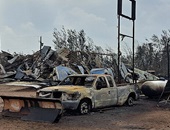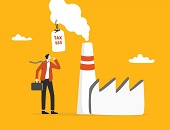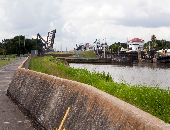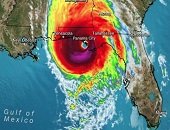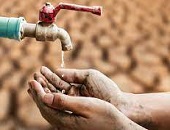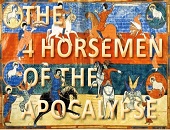State of Wildfires
The potential for burning grows every month under climate change, as drought conditions increase in frequency and intensity. The dangers change unevenly, country by country and region by region. Ultimately, the operational risk of wildfires adds to country risk. But how bad is the current situation? Has anyone tried to benchmark, or systematically quantify, the events and the damages? An effort to benchmark the state of destruction has begun in a climate centre in England, the Tyndall Centre for Climate Change Research at the University of East Anglia in Britain. The findings of an expert panel were released in the inaugural report, “State of Wildfires 2023–2024,” […]
How to Measure Nature Risk?
In June 2024, Dawn Lalonde, a beekeeper in northern Ontario noticed a sudden die-off of about a million bees. The bee die-off affects much more than the amount of honey she can collect from her hives. Without bees, local crops and orchards do not get adequately pollinated, leading to lower yields. This is but one recent example of a type of risk coming into new prominence in business and economics: nature risk. Nature risk, the loss of things in the world not created or domesticated by humans, affects businesses and economies directly, by impacting operations such as lack of pollination, […]
Geopolitical Risks
Many conflicts and potential conflicts disturb various parts of the world in the post-pandemic era. For those who must manage various sources of risk in a portfolio, what are the biggest threats on the horizon? Is there a common thread among several sources of conflict? The Global Association of Risk Professionals (GARP) provides a series of podcasts featuring specialists discussing their area of risk and we at TextMedic enjoy listening in. This is the first podcast we have summarized in our blog, and for starters we delve into country risk. On April 14, 2024, Daniel Wagner, CEO of Country Risk […]
Tax or Cap?
Carbon tax or cap and trade? These are terms bandied about in the political arena as countries decide how to address global warming. “There is a clear consensus among economists,” said Roger Gordon, professor of economics at University of California at San Diego, “that the best way to address global warming is through the global use of a carbon tax on CO2 emissions.” On January 18, 2024, he was speaking at a webinar as part of the biweekly series of talks, titled the Virtual Seminar on Climate Economics, sponsored by the Federal Reserve Bank of San Francisco (FRBSF). “With a carbon tax,” […]
Flood Economics
When it comes to natural disasters such as flooding, does it make more economic sense to control the flood? Or to sit back, suffer the consequences, and count on insurance? Climate change leads to more frequent and more intense flooding. As these risks intensify, public funds will often be used to protect communities. Recent work done by economists estimates the amount and distribution of benefits from a major form of public flood risk adaptation, flood control levees. A levee is an embankment built to prevent the overflow of a river. The efficiency and equity implications of levees were investigated by […]
Bearing Witness
Climate change is the biggest issue of the present day. It affects the physical world, and will irrevocably change economics and business. For scientists coping with climate changes, today we at TextMedic pause to consider: How does it feel to know you are studying the last of certain species? or ecosystems that are irreparably damaged? Today’s weekly magazine of the New York Times calls itself “the climate issue.” Several pieces of excellent journalism speak about climate change. The most poignant article in the climate issue profiles 7 scientists whose life’s work will soon be made irrelevant, due the destructive power […]
The Role of Insurance in Recovery
Climate change is bringing on events, such as hurricanes and wildfires, of greater severity and frequency than ever before. How does insurance help communities rebuild? What economic barriers arise during recovery? Is insurance the best way to provide disaster relief? These are some of the questions tackled by Carolyn Kousky of the Environmental Defense Fund (EDF) in her recent book and research. She is a co-editor of A Blueprint for Coastal Adaptation and author of Understanding Disaster Insurance: New Tools for a More Resilient Future. On October 19, 2023, Carolyn Kousky, Associate VP, Economics and Policy Analysis at EDF, gave a presentation on […]
Managing Water Risk
Flooding, drought, and the polluted quality of water pose a business risk to the agricultural sector, which affects everything from geopolitical risk to inflation. What is the cause of water risk, and how can it be mitigated? On October 3, 2023, Catherine David, Director of Collaboration and Change at Waste and Resources Action Programme (WRAP) and a specialist in water risk, spoke about water management designed for sustainability. The webinar was sponsored by the Global Association of Risk Professionals (GARP) and was moderated by Jo Paisley, President, GARP Risk Institute. “According to the FAO,” David said, “by 2030, global demand for […]
Heated Exchange
Climate-related natural disasters are increasing in frequency and severity and costs. Since climate change is not equal across countries, how does a country’s exchange rate respond to such shocks? Furthermore, is it possible to build an economic model to predict future changes? On April 6, 2023, Galina Hale, professor of economics at the University of California at Santa Cruz, delivered a webinar about the effect of climate change on exchange rates. This was part of the series of talks sponsored by the Federal Reserve Bank of San Francisco (FRBSF), titled the Virtual Seminar on Climate Economics. She reported results from […]
Chemistry and the Economy
Risks are multiplying and becoming more complex. The chemical industry is intrinsically connected to the economy. Can chemistry help solve the biggest crises facing us today? On December 15, 2022, the American Chemical Society hosted a virtual webinar, “Chemistry and the Economy.” The moderator was Bill Carroll, principal of Carroll Applied Science, who spoke to Paul Hodges, chairman of the Swiss-based strategy consulting firm New Normal. In speaking about risks, Hodges does not beat around the bush. He began with what he called “the four horsemen of the apocalypse.” He stated, “First there was the pandemic and associated supply chain […]

